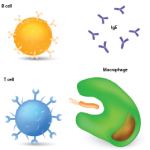Research has revealed how the prevalence of anti-nuclear antibody (ANA) positivity has changed over the past 25 years, raising questions about the role of ANA in autoimmunity and disease.


University of Chicago School of Medicine: Lauren He, MD; Ana B. Arevalo, MD; & Kichul Ko, MD |
Research has revealed how the prevalence of anti-nuclear antibody (ANA) positivity has changed over the past 25 years, raising questions about the role of ANA in autoimmunity and disease.

David S. Pisetsky, MD, PhD |
ACR CONVERGENCE 2020—Held Nov. 5–9, the ACR’s first fully virtual annual meeting is a wrap, but that doesn’t mean it’s too late to catch the highlights. Dozens of research abstracts on various aspects of lupus were presented during the fully virtual event, and David S. Pisetsky, MD, PhD, professor of medicine and immunology at Duke…

2019 Lupus Foundation of America Gary S. Gilkeson Career Development Awards Emily Smitherman, MD, assistant professor, pediatric rheumatology, University of Alabama at Birmingham, and Children’s of Alabama, one of four recipients of the Gary S. Gilkeson Career Development Awards, is interested in identifying predictors for differences in disease activity within the pediatric population. To accomplish…

How does a patient transition from health to active SLE? This question is the crux of the research conducted by Judith A. James, MD, PhD, and colleagues…

The new EULAR/ACR classification criteria for SLE offer improved sensitivity and specificity, as well as more accurately reflect the current tests used to clinically diagnose SLE. A positive ANA test is obligatory…

Catherine Kolonko |
A recent study explored medical concerns for patients who have lupus markers, but fall short of meeting enough criteria for official disease classification. Investigators at the Oklahoma Medical Research Foundation conducted a large study to explore current treatments of patients with incomplete lupus erythematous (ILE) and to compare antibody characteristics to healthy people and patients…

SAN DIEGO—To manage patients with systemic lupus erythematous (SLE), rheumatologists must be aware of potentially serious complications affecting many organ systems. On Nov. 7 at the 2017 ACR/ARHP Annual Meeting, two experts offered insights on cardiovascular and hematological complications of lupus. Myocardial Disease in Lupus Lupus patients are at increased risk for heart-related complications, especially…

SAN DIEGO—B cell signaling goes awry in many patients with systemic lupus erythematosus (SLE), triggering pathogenic autoimmune responses and clinical disease. At the Rheumatology Research Foundation’s 2017 Evelyn V. Hess Memorial Lecture, held on Nov. 5 at the ACR/ARHP Annual Meeting, researcher Ignacio Sanz, MD, discussed B cells’ role in this complex disease. Because lupus…

SAN DIEGO—After sifting through the nitty-gritty of the rheumatic disease literature on basic science, Richard Pope, MD—professor of medicine specializing in rheumatology at Northwestern University Feinberg School of Medicine—underscored several findings he thought stood out from the pack in his Year in Review talk at the 2017 ACR/ARHP Annual Meeting. He reviewed findings from November…

During the ACR/ARHP Annual Meeting, Richard Pope, MD, highlighted some of the top scientific literature on rheumatic disease from 2017. The review session discussed research on the effects of microglia on the central nervous system of SLE patients, the role of adenosine in osteoarthritis and more…